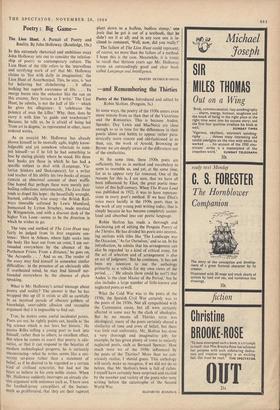Poetry : Big Game— IN this extremely rhetorical and ambitious
essay John Holloway sets out to consider the relation- ship of poetry to contemporary culture. The Lion Hunt of the title refers to the 'marvellous and terrifying work of art' that Mr. Holloway claims to 'live with daily in imagination,' the Lion Hunt of Assurbanipal. This, he says, is 'not for believing but disbelieving . . . it offers nothing but superb awareness of life. . . . Its energy burns into the onlooker like the sun on this creamy, fiery terrace as I write.' The Lion Hunt, he admits, is not the half of life t • which• he gives his allegiance: it 'celebrates the potency of man the killer.' Why, then, does he carry it with him 'as guide and touchstone'? Because, he tells us, he is afraid of being led 'from art to dogma,' as represented in other, more ordered works.
As an essayist Mr. Holloway has already shown himself to be mentally agile, highly know- ledgeable and yet somehow reluctant to com- mit himself—as if he felt he had something to lose by stating plainly where he stood. His three best books are those in which he has had a specific subject to deal with (Language, Vic- torian thinkers and Shakespeare); for a writer and teacher of his ability his two books of essays contain an abnormal amount of sheer waffle. One hoped that perhaps these were merely pot- boiling collections; unfortunately, The Lion Hunt tends to dispel this hope: the beautifully wrought, learned, culturally wise essay—the British Rail- ways timetable softened by Lewis Mumford, humanised by Lytton Strachey, made mystical by Wittgenstein, and with a discreet dash of the higher Van Loon—seems to be the direction in which he wishes to go.
• The tone and method of The Lion Hunt may fairly be judged from its first exquisite sen- tence: 'Here in Athens, where light soaks into the body like heat out from an oven, I am sur- rounded everywhere by the absence of the Parthenon Frieze. From a distance,' he goes on, 'the Acropolis . . .' And so on. The reader of the essay may find himself in somewhat similar difficulties: in the presence of an obviously able if overheated mind, he may find himself sur- rounded everywhere by the absence of plain Speaking.
What is Mr. Holloway's actual message about poetry and reality? The answer is that he has wrapped this up (if it exists at all) so carefully in an involved parade of obscure gobbets of knowledge, over-subtle allusion and recondite argument that it is impossible to find out.
True, he makes some useful incidental points. Poets are not, he rightly points out, hostile to 'the big science which is not laws but history.' He quotes Rilke -telling a young poet to look into himself, rather than to others, to excellent effect. But when he comes to assert that poetry is edu- cative, or that it can respond to the beauties of modern technological progress, he is curiously unconvincing—what he writes seems like a uni- versity set-piece rather than a statement of belief, as if he desired to be regarded as a certain kind of civilised syncretist, but had not the heart to believe in his own noble stance. When 111r. Holloway suddenly interrupts an already elu- sive argument with sentences such as,'! have seen the football-jersey caterpillars of the burnet- moth so proliferated, that they ate their ragwort plant down to a leafless, budless stump,' one feels that he got it out of a textbook, that he didn't see it at all; and in any case one is in- clined to comment, 'Well, now, did you really?'
The failure of The Lion Hunt could represent, of course, no more than the failure of a method. T hope this is the case. Meanwhile, it is ironic to recall that thirteen years ago Mr. Holloway wrote an outstandingly good and clear book called Language and Intelligence.
MARTIN SEYMOUR-SMITH


































 Previous page
Previous page